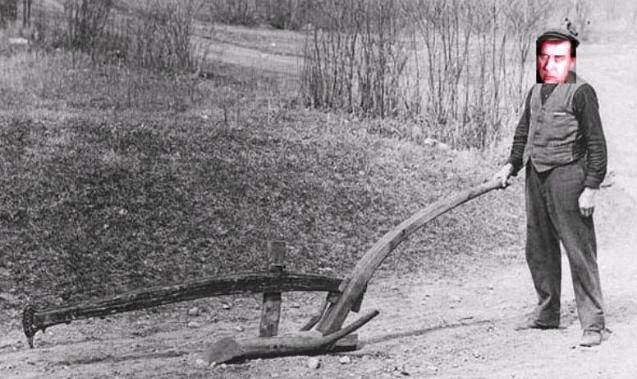| Adapted for the Internet from: Why God Doesn't Exist |
| Return to subsistence farming? |
Will the government remember you and come to your aid? Will it dig in to its massive food reserves, send in the cavalry,
and save the day?
The first thing you should be aware of is that governments don’t keep emergency reserves of grains for seven years like
the biblical pharaohs allegedly did because such a policy would depress prices even below their already artificially high
level. It’s basic Econ 101: the lower the stock, the higher the price. So, in this day and age, in order to make agriculture
cost effective, we live so to speak day to day. The entire stockpile of food on hand can at best last the most advanced
nations for about 3 months. [1] Now guess who will get any of it.
Perhaps you believe that you would rush to the country and begin a new life as a subsistence farmer. Ah, back to nature.
Green acres is the place to be. Fresh air, healthy food, a stroll with the wife down the meadow after a hearty lunch…
Yeah? What do you know about farming? How many potatoes and pounds of rice do you need for the winter? Where
will you get seeds, fertilizers, and water? Will you wait a few months until the potatoes are ripe? What if 10,000 neighbors
from the city want to share in your good fortune? Will you risk planting today so that a guy with a bigger gun decides to
be your long lost friend tomorrow?
Subsistence and casual farmers instantly become hoplites: planting by day and defending the crop by night. It’s an
impossible task when you and thousands of others are competing for one potato.
In developed nations like the US, subsistence farmers are counted with the fingers on one hand, but we can speculate
that their numbers will instantly swell when industrial farmers quit producing for the market. In the absence of profits,
agricultural corporations will disband and their employees can at best become subsistence farmers.
Will any farmer plant for the market?
Assuming they’re successful, what will they exchange their product for? Money? There is no reason to plant for others
if they have nothing to offer you in exchange. The rule is that the only thing of value is food.
‘Uncivilized,’ subsistence farmers in remote places of Asia, Africa, and South America will fare no better than urban Man.
The Saharan nation of Chad, one of the most relegated economies in the world, serves as a good example. In 1986, 83%
of the inhabitants were subsistence farmers contributing almost 50% to GDP. [2] Today, Chad’s farmers are much more
productive thanks to ongoing technical and material help from global organizations such as the FAO. In spite of this,
they only generate 22.6% of GDP. [3] As services (currently at 41.7% of GDP) rapidly develop, the structure of Chad’s
economy will become like that of most other nations. Despite its backwardness, Chad is swiftly leaving subsistence
farming behind. Cities are replacing rural villages, and in the villages traditional tribes now run agricultural cooperatives
that produce for a market. This trend converts the term 'subsistence farming' to a misnomer because it conveys the
misleading impression that farmers produce food only for their consumption. Clearly, if Chad produces mainly peanuts
and cotton, the farmers engaged in this business are not what you would call ‘subsistence.’ In order to avert future crises,
the FAO coaches farmers to be more than self-sufficient. The contemporary ‘subsistence’ farmers and tribes produce
surpluses that they sell to distributors. The more aware the farmer is that there is a world out there with TVs and cell
phones, the more the Chadian farmer attempts to commercialize his agriculture.
More revealing in so-called ‘subsistence farming’ economies like that of Chad is that FAO’s intervention was necessary
because of civil war. Farmers were unable to plant or harvest during times of strife because rival factions invaded their
lands. Should the world economy collapse, there’s no place to hide from persecution and looting, and those who do
manage to find a place to hide certainly are not in a position or mood to have families. They would merely live out their
lives as best they could in their little fox holes. Again, in the old days, the few preyed on the many. In the post job market
crash, the tables are turned and the many prey on the few.
- ________________________________________________________________________________________
- Last modified 03/01/08
- Copyright © by Nila Gaede 2008

| Is this what I survived the Great Extinction for? I gotta pull the plow by hand, but what's the use if I have no seeds and no fertilizers anyways. I will have to wait a few months before something grows. My wife says that she will not get pregnant until we have something to eat, but there is nothing alive fit to eat except this dumb bird and she's too small. All she does is shit on my head all day long. |

Module main page: Rejoinders: the experts voice their objections to the theory
Pages in this module:
- 1. Government relief?
2. Brisk business bartering beanies?
3. This page: Return to subsistence farming?
4. Create armies?
5. Duncan: Let's have a kid, Eve!
- 6. Epilogue
7. Corollary. PETA: How to kill, torture, and sterilize unwanted animals humanely
